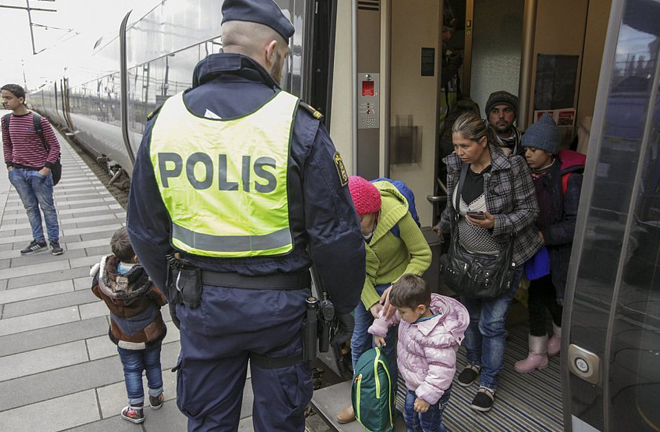Scholars: Refugee crisis tests Schengen Agreement

A Swedish Policeman checks refugees'papers at Hyllie station south of the city of Malmo.
In response to the ongoing refugee crisis, many EU countries, such as France, Germany and Sweden, have imposed temporary border checks to curb the flow of asylum seekers.
Daniel Wilsher, a specialist in asylum, immigration and human rights law at the City Law School in London, made it clear that such a seemingly unavoidable move represents the collective failure of the signatories to the Schengen Agreement, i.e. they forgot to incorporate “burden sharing” into their joint asylum policy.
Steve Peers, a law professor at the University of Essex, said “the main point of the Schengen Agreement is to abolish border checks between the participating countries to speed up the movement of people and goods.”
However, in light of the current situation, the last thing signatory countries want is an uninhibited, rapid flow of personnel and commodities, Peers said. After the Paris massacre of Nov 13, it was discovered that one of the terrorists in the assault arrived on the Greek island of Lesbos last month posing as an asylum seeker.
“The real trouble is not the Paris attacks but the migration in southeastern Europe. The policy adopted by signatories to the Schengen Agreement assumes that asylum seekers will arrive ‘evenly’ across the EU. Migrants might seek to pass through EU countries to a chosen destination, but this was discouraged by the Dublin Regulation, which permitted later states to pass asylum seekers back to earlier states,” Wilsher said.
Wilsher added that it is not feasible for later states to send back asylum seekers under the provisions of the Dublin Regulation, “because the smaller countries on the route from Turkey to Greece cannot and will not take back those that they have allowed through who are heading north.” In other words, these countries refuse to share the burden, leaving overwhelmed northern countries no other choice but to reestablish borders.
“Like the euro zone, the Schengen Agreement is an unfinished project,” said Paul De Grauwe, a professor of European Political Economy at the London School of Economics and Political Sciences.
Yan Yong is a reporter at the Chinese Social Sciences Today.
